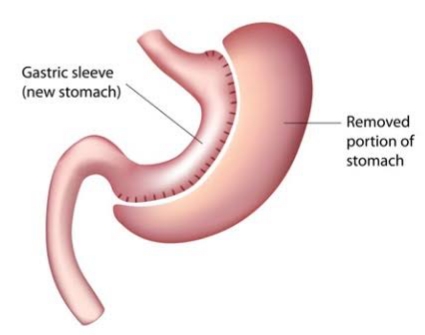Lapsurgery.com.au, Understanding the Pain Level of Gastric Sleeve Surgery – Gastric sleeve surgery, also known as sleeve gastrectomy, is a bariatric procedure designed to assist individuals in achieving significant weight loss. While the surgery’s primary goal is to enhance overall health, many individuals express concerns about the potential pain associated with the procedure. In this article, we will delve into the question: How painful is gastric sleeve surgery?
Anesthesia and Initial Discomfort, Gastric Sleeve Surgery:

Gastric sleeve surgery is performed under general anesthesia, ensuring patients are completely unconscious during the procedure. This eliminates any pain during the surgery itself. However, some individuals may experience mild discomfort or soreness at the incision sites following the surgery.
Postoperative Pain Management:
Medical advancements have significantly improved postoperative pain management for gastric sleeve patients. Surgeons often prescribe pain medications to alleviate discomfort during the initial days after the surgery. It’s essential for patients to adhere to the prescribed medication schedule for optimal pain relief.
Short-term Pain vs. Long-term Benefits:
The initial discomfort associated with gastric sleeve surgery is typically short-lived. As the body heals, the pain diminishes, and patients begin to experience the long-term benefits of the procedure, including significant weight loss and improvements in overall health.
Individual Variations in Pain Perception:
Pain perception varies among individuals, and factors such as pain tolerance, overall health, and adherence to postoperative guidelines can influence the level of discomfort experienced. While some may describe the postoperative period as mildly uncomfortable, others may find it more challenging.
Emphasizing Lifestyle Changes:
It’s crucial to highlight that the focus of gastric sleeve surgery is not only on pain management but also on encouraging positive lifestyle changes. Patients are advised to adopt a healthy diet and regular exercise routine to maximize the effectiveness of the surgery and maintain long-term weight loss.
Consultation with Healthcare Professionals:
Prospective patients should openly discuss concerns about pain with their healthcare team during the preoperative consultations. This ensures that realistic expectations are set, and appropriate measures are taken to manage pain effectively.
In conclusion, while some discomfort is associated with gastric sleeve surgery, advancements in medical practices and pain management techniques have significantly minimized the overall pain experienced by patients. It’s essential for individuals considering this procedure to engage in open communication with their healthcare professionals, follow postoperative guidelines diligently, and focus on the long-term health benefits that gastric sleeve surgery can provide.
Postoperative Support and Monitoring:
Healthcare professionals play a crucial role in postoperative care. Regular check-ups and consultations help monitor the patient’s recovery progress. Any persistent or unusual pain can be addressed promptly, ensuring a smoother and more comfortable healing process.
Nutritional Guidance for Recovery:
Nutritional adjustments are integral to the success of gastric sleeve surgery. While pain management is important, so is ensuring patients receive the necessary nutrients for recovery. Healthcare professionals often provide dietary guidelines to support healing and prevent nutritional deficiencies.
Physical Activity and Rehabilitation:
Gradual reintroduction of physical activity is a key component of the recovery process. While strenuous exercise is initially restricted, engaging in light activities promotes circulation, reduces the risk of complications, and contributes to an overall sense of well-being.
Psychological Support:
The journey after gastric sleeve surgery involves not only physical but also psychological adjustments. Support from mental health professionals or support groups can aid individuals in coping with the emotional aspects of significant lifestyle changes and weight loss.
Long-term Success and Reduced Pain:
As patients adapt to their new lifestyle, the long-term benefits of gastric sleeve surgery become more evident. Weight loss can alleviate conditions associated with obesity, such as joint pain and respiratory issues, contributing to an improved quality of life and reduced overall discomfort.
Closing
Gastric sleeve surgery, though initially associated with some discomfort, proves to be a transformative and effective solution for individuals struggling with obesity. By prioritizing collaboration with healthcare professionals, adherence to postoperative guidelines, and embracing necessary lifestyle changes, patients can not only manage pain effectively but also enjoy the long-term benefits of improved health and well-being.

